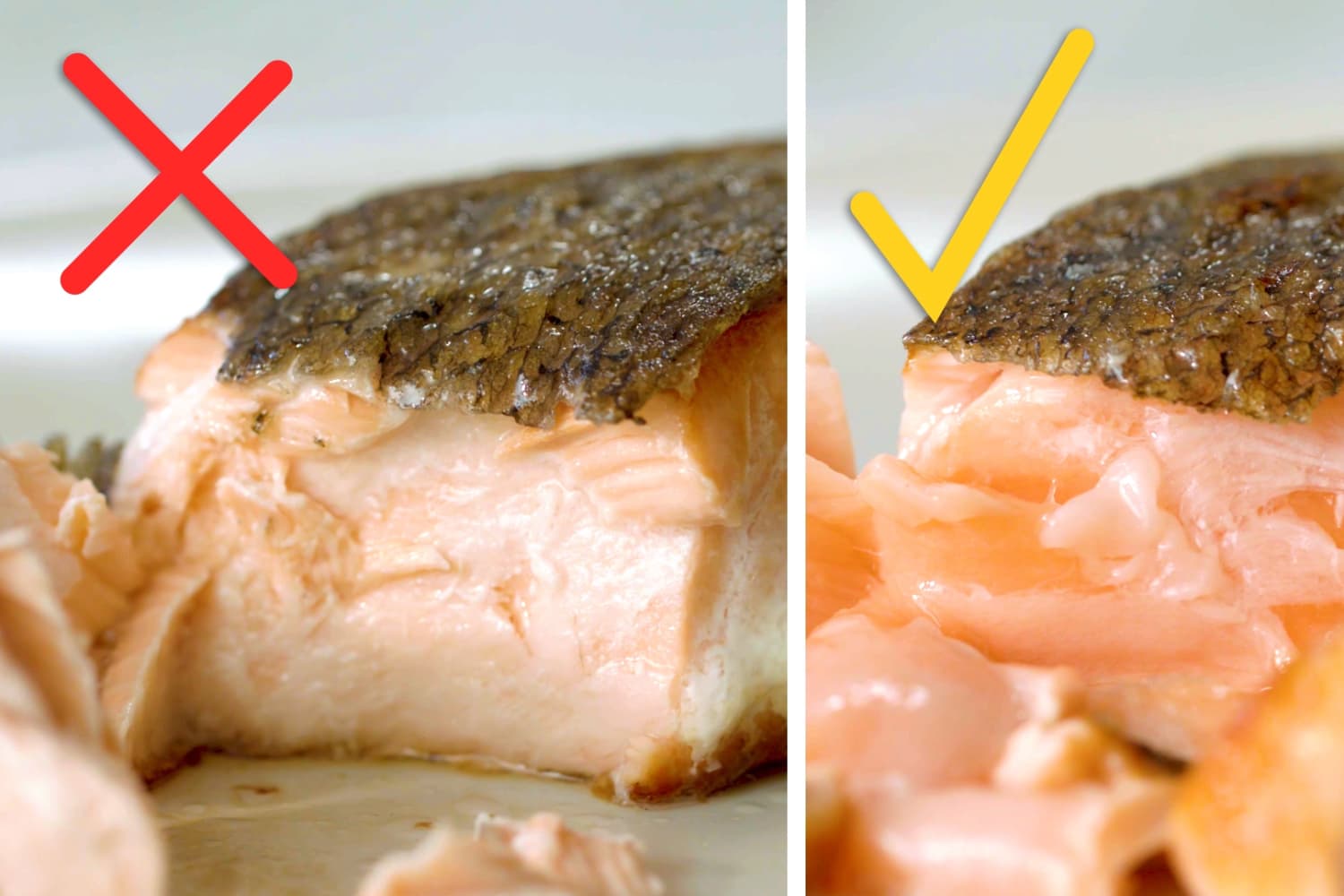Cooked salmon is good for 3 to 4 days in the refrigerator. Always store it in an airtight container.
Salmon is a popular fish known for its rich flavor and numerous health benefits. It is a great source of protein, omega-3 fatty acids, and essential vitamins. Proper storage is crucial to maintain its freshness and safety. After cooking, refrigerate salmon promptly to extend its shelf life.
Use airtight containers to prevent contamination and moisture loss. Eating spoiled fish can lead to foodborne illnesses, so always check for signs of spoilage before consuming. Consuming within the recommended timeframe ensures you enjoy the best taste and nutritional value. For longer storage, consider freezing cooked salmon, which can extend its life up to three months.
:max_bytes(150000):strip_icc()/200296-Individual-Salmon-Wellingtons-ddmfs-4x3-step-02-2141-f64a0c6df6f94a4f8a58983380c144b5.jpg)
Credit: www.allrecipes.com
Shelf Life Of Cooked Salmon
Knowing the shelf life of cooked salmon ensures you enjoy it safely. Cooked salmon offers delightful flavors but has a limited shelf life. Proper storage is key to keeping it fresh and tasty.
Refrigerator Storage
Store cooked salmon in the refrigerator within two hours of cooking. Use airtight containers or wrap it tightly in aluminum foil or plastic wrap. This keeps the salmon fresh and prevents contamination.
How long does cooked salmon last in the fridge? It lasts 3 to 4 days if stored properly. After this period, the quality starts to decline. Always check for signs of spoilage before eating.
| Storage Method | Duration |
|---|---|
| Refrigerator (Airtight Container) | 3 to 4 days |
Freezer Storage
For longer storage, freeze cooked salmon. Ensure it is cooled completely before freezing. Use heavy-duty aluminum foil, freezer wrap, or freezer bags.
How long does cooked salmon last in the freezer? It can last 2 to 3 months with proper storage. Label the packaging with the date to track storage time.
| Storage Method | Duration |
|---|---|
| Freezer (Heavy-duty wrap or bag) | 2 to 3 months |
Remember to thaw frozen salmon in the refrigerator. This helps maintain its texture and flavor. Avoid thawing at room temperature to prevent bacterial growth.
By following these steps, you can keep your cooked salmon fresh and delicious. Enjoy your salmon while it’s still at its best quality!
Identifying Spoiled Salmon
Knowing how to identify spoiled salmon can save you from food poisoning. This section will help you recognize the signs of bad salmon. We will focus on visual clues, smell, and texture.
Visual Signs
Fresh salmon looks vibrant and moist. Spoiled salmon, however, shows clear signs. Look for these visual cues:
- Dull or grayish color
- Dry or flaky texture
- White, milky film on the surface
Smell And Texture
Fresh salmon has a mild, ocean-like smell. Spoiled salmon will have a strong, sour odor. This is a clear sign it has gone bad.
Touch the salmon. Fresh salmon should feel firm and moist. Spoiled salmon will feel slimy or sticky. These textures indicate it is no longer safe to eat.
Proper Storage Techniques
Proper storage techniques are essential to keep cooked salmon safe and tasty. Correct storage methods can help preserve the flavor and quality of your salmon. Below are some tips and guidelines to ensure your cooked salmon stays fresh for as long as possible.
Cooling And Wrapping
Cooling cooked salmon quickly is crucial. After cooking, let the salmon cool at room temperature for no more than two hours. This helps prevent bacterial growth. If you can, place the salmon in the fridge sooner.
Wrapping the salmon properly keeps it fresh. Use aluminum foil or plastic wrap. Make sure to wrap it tightly. This prevents air from entering and keeps moisture in.
Containers And Bags
Containers are an excellent option for storing cooked salmon. Choose airtight containers. Glass and plastic containers both work well. Make sure the lid is secure.
Storage bags are another great choice. Use zipper-lock bags made for food storage. Remove as much air as possible before sealing. This helps maintain the salmon’s freshness.
| Storage Method | Recommended Container | Maximum Storage Time |
|---|---|---|
| Refrigerator | Airtight container or wrapped tightly | 3-4 days |
| Freezer | Freezer-safe bag or container | 2-3 months |
Following these storage techniques ensures your cooked salmon stays fresh and delicious. Whether you use a container or a bag, always prioritize airtightness and quick cooling.
Extending Shelf Life
Cooked salmon is delicious, but it doesn’t last forever. Knowing how to extend its shelf life can help you enjoy it longer. Here are some effective methods to keep your cooked salmon fresh.
Marinating And Seasoning
Marinating can help extend the shelf life of cooked salmon. Acidic ingredients like lemon juice or vinegar can act as preservatives. Seasoning with salt and spices also helps. Salt draws out moisture, preventing bacteria growth. Spices like garlic and ginger have antimicrobial properties. Here’s a simple marinade recipe:
- 2 tablespoons lemon juice
- 1 tablespoon olive oil
- 1 teaspoon salt
- 1 clove garlic, minced
- 1 teaspoon grated ginger
Mix all ingredients and coat the salmon evenly. Let it marinate for at least 30 minutes before cooking.
Vacuum Sealing
Vacuum sealing is another way to extend the shelf life of cooked salmon. This method removes air, which slows down bacterial growth. Here are the steps to vacuum seal your cooked salmon:
- Let the salmon cool completely.
- Place the salmon in a vacuum seal bag.
- Use a vacuum sealer to remove the air and seal the bag.
Vacuum-sealed salmon can last up to two weeks in the refrigerator. It can also be frozen for up to six months.
Health Risks Of Spoiled Salmon
Eating spoiled salmon can be dangerous. It can lead to serious health problems. Spoiled salmon can harbor harmful bacteria and toxins. These can make you very sick.
Foodborne Illnesses
Consuming spoiled salmon can lead to foodborne illnesses. Some common bacteria found in spoiled salmon include Salmonella, Listeria, and Vibrio. These bacteria can cause severe infections.
| Bacteria | Possible Effects |
|---|---|
| Salmonella | Diarrhea, fever, and stomach cramps |
| Listeria | Fever, muscle aches, and gastrointestinal symptoms |
| Vibrio | Watery diarrhea, abdominal cramping, and nausea |
Symptoms To Watch For
If you eat spoiled salmon, watch for symptoms. Symptoms can appear within hours. Common symptoms include:
- Nausea
- Vomiting
- Diarrhea
- Abdominal pain
- Fever
If you experience these symptoms, seek medical help. It is important to act quickly.

Credit: www.thekitchn.com

Credit: karalydon.com
Frequently Asked Questions
How Long Can Cooked Salmon Be Kept In The Fridge?
Cooked salmon can be safely stored in the fridge for up to 3-4 days. Ensure it is in an airtight container.
Can You Freeze Cooked Salmon To Extend Its Shelf Life?
Yes, you can freeze cooked salmon. It will last up to 2-3 months in the freezer.
What Are The Signs That Cooked Salmon Has Gone Bad?
Bad salmon will have a sour smell, slimy texture, and dull color. Do not consume it.
Is Reheating Cooked Salmon Safe?
Yes, reheating cooked salmon is safe. Ensure it reaches an internal temperature of 165°F (74°C).
Conclusion
Properly stored, cooked salmon can last 3 to 4 days in the fridge. Always check for freshness before consuming. Freezing extends its shelf life to 2-3 months. Knowing these storage tips ensures your salmon remains safe and delicious. Enjoy your meals with confidence, knowing you’re eating fresh and healthy fish.
